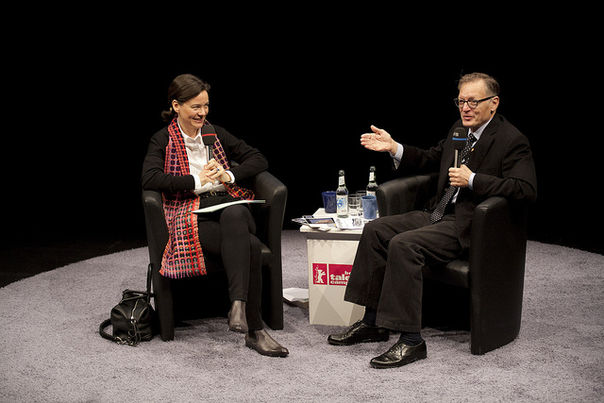A Lively Introduction to an Unpopular Process
'Dura lex, sed lex': two experts brief Talents on the insidious legal aspects of filmmaking.

Mareile Büscher and Michael C. Donaldson
The Berlinale Talent Campus is dedicated to uniting young filmmakers from across the world; and if there is one common factor that unites most filmmakers, it is a lack of understanding about entertainment law. At “Let's Make It Legal“, held in HAU 3 on Monday, Mareile Büscher (a Berlin-based entertainment lawyer) and Michael C. Donaldson (a general counsel to numerous US film companies) attempted to shine a light on this mysterious but integral step in the filmmaking process.
Büscher and Donaldson were a well-balanced duo – her sensible insights blending perfectly with his excitable, but no less astute, approach – but it quickly became clear that there was a more practical reason for partnering these transatlantic experts. Copyright law in Europe was created centuries ago to protect artists from illegal copying of their work. It is therefore a very artist-centric system where the artist retains copyright of his work without exception, and can sell or retain individual rights at will. But in the US, the movie moguls of the early 20th century lobbied Washington to create a “work for hire“ clause, meaning that the studios became the “author“ of any work that contracted artists created. This basic difference ripples through every facet of the legal framework in these two regions, meaning that they are often diametrically opposed, and the pros and cons of each system made for a fascinating discussion.
The engaging session took in topics such as trademark use (it’s allowed, so long as you don’t misrepresent the brand), media clearance (section 22 of the US copyright act is a “right of quotation”, approving the use of short segments of music, video, etc. for illustrative purposes), and a host of other essential concepts that most filmmakers know only by name. The central message of the session was that a basic knowledge of legal frameworks can make for a much more efficient career in any sector of the entertainment industry. Knowing the basic pitfalls that can harm a project allows a filmmaker to make a more informed decision about where to invest his or her time and money.
The most striking thing about the talk was the level of eager participation from the audience. This was not a room full of people who begrudgingly accepted the need to learn about legality, and sat vacantly taking notes while the experts spoke. Every comment from the experts resulted in a raft of insightful queries; and in the end the event felt more like a room full of agents and lawyers trying to hammer out one almighty deal. It bodes well for the next generation of filmmakers that so many writers, directors and producers are eager to take their careers into their own hands.


301 Moved Permanently